
History
Resolute and Warmhearted
On the 100th birthday of Grete Wittkowski, a Jewish Communist
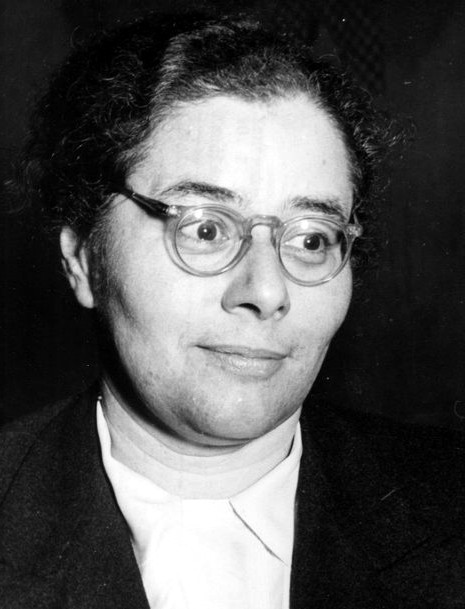
ND Archive
Grete Wittkowski |
August 14, 2010
Translated by Otto Hinckelmann, August 24, 2010
In the 1960's, with a doctorate in economics, she was the first woman to be appointed as a Deputy Minister President of the German Democratic Republic. A few years ago, I found a file in the Swiss Federal Archives on Margarete Wittkowski. A few days after the November 1938 pogrom2 in Germany, she had been arrested in Zurich for illegal political activities and had to leave Switzerland a short time later. There was nothing in the file regarding her activities on behalf of the Communist Party of Germany's (KPD's) external affairs department. Nor was there a mention of the fact that she had worked as an editor of the illegal newspapers that were distributed by the KPD in southern Germany. She often made trips to the southern Baden border area where she handed over illegal publications and messages. These were fairly risky activities for this 5'8" woman (this physical description was noted next to her fingerprints).
She was born on August 18, 1910 into a Jewish family in Posen3. As a student of economics in Berlin in 1932, she at first joined the Zionist movement, but after discussions with leftist friends she became a member of the KPD. In the summer of 1932, she had passed her exams for a degree in economics and by the end of February 1934 she had passed her oral exam in Basel, Switzerland for a doctoral degree. In the spring of 1934, she returned to Berlin and published jointly with her friend Ullrich Fuchs a newspaper for the supporters of a communist labor union (RGO4). At the beginning of 1935, she barely escaped arrest and fled to Switzerland. In 1939, she was able to emigrate to England.
Grete Wittkowski returned to Berlin in June of 1946 to help rebuild the country that had been destroyed by the war. The Party decided otherwise and transferred her, despite her objections, to the economics section of the newspaper Neues Deutschland [New Germany] which had been founded just a few weeks previously.
Two years later, she was promoted to the position of Deputy Chairman of the German Economic Commission, whose function it was to manage the economy in the Soviet Occupation Zone. After attending the Party college of the Socialist Unity Party5, she held no specific position in the newly formed East German state. Instead, she became the chairperson of the Consumer Agencies. In this period, those who had emigrated to the West were more likely to be considered as unreliable comrades. Nevertheless, as a result of the changes brought about in the Soviet Union by the death of Stalin and in the GDR by the demonstrations of the 17th of June 19536, in 1954 Grete Wittkowski became the First Deputy Chairman of the State Planning Commission and she was elected to the Central Committee of the SED. She was an advocate of socialist self-management7 and as a result she was accused of "Managerism"8 in 1956.
Following a temporary demotion, in February 1961 she was appointed Deputy Chairman of the Council of Ministers where she was responsible for the difficult areas of Trade, Supply, and Agriculture. From 1967 until her death in October 1974 she managed the State Bank of the GDR and from 1963 to 1974 she was again a member of the Central Committee of the SED. Her supporters valued her as a capable leader with the ability to find the essence of problems to be solved, who included her co- workers in problem solving, and who, on the basis of her factual knowledge, earned the respect of persons above and below her in the organization.
When Greta Kuckhoff9 became my guardian in the mid- 1950's, I got to know her friend and housemate, Grete Wittkowski. She was a resolute, and, at the same time, a warmhearted person with many interests, an avid reader and theater-goer, and for my questions, a very accessible woman. Among her close friends was Jurgen Kuczynski10. In her large bookcase, I discovered two books that they had co-authored: in London in 1942, The Economics of Barbarism: Hitler's New Economic Order in Europe, and in Berlin in 1947: German-Russian Trade Relations in the Past 150 Years.
After her death in 1974, I found her printed doctoral dissertation, Big Banks and Industry in Germany, 1924 to 1931. She had dedicated it to "My Mother!" Her mother and many of her relatives were murdered in Auschwitz and other concentration camps. It wasn't until many years after the war that she was able to determine this with certainty. She lived with this terrible knowledge until the very end of her life.
Translator's Notes
1. 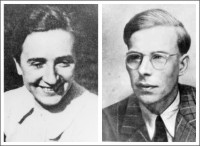 The author of
this biographical sketch of Grete Wittkowski is the son of Hilde (1909 -
1943) and Hans (1916 - 1942) Coppi. Both were members of the German
underground resistance group Rote Kapelle [Red Orchestra]. They
were arrested by the Gestapo [State Secret Police] on September 12,
1942.
The author of
this biographical sketch of Grete Wittkowski is the son of Hilde (1909 -
1943) and Hans (1916 - 1942) Coppi. Both were members of the German
underground resistance group Rote Kapelle [Red Orchestra]. They
were arrested by the Gestapo [State Secret Police] on September 12,
1942.
His father was tried by the RKG, a military style court (see note 9), sentenced to death on December 19, 1942, and executed on December 22nd.
His mother's trial was delayed on account of her pregnancy. Her son, the author of this sketch, was born on November 27th. His mother was sentenced to death on January 20, 1943 by the same court. Hitler turned down a plea for clemency in July and she was executed on August 5, 1943.
2. 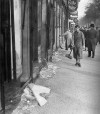 This infamous
event is usually referred to as Kristallnacht, which is an ironic
reference to the broken glass which littered the streets in front of the
many Jewish-owned stores that had their windows smashed during the night
of November 9-10, 1938. It was a series of anti-semitic riots spread
across Germany, Austria, and the ethnic German-settled portion of
Czechoslovakia. It was directed against Jews and Jewish cultural symbols,
primarily synagogues. It was instigated and carried out semi-officially by
the SA [Sturmabteilung, Attack Division], SS [Schutzstaffel,
Guard Staff], Gestapo [Geheimestaatspolizei, State Secret Police],
and the Hitler Youth, all of which were official organizations of the Nazi
state.
This infamous
event is usually referred to as Kristallnacht, which is an ironic
reference to the broken glass which littered the streets in front of the
many Jewish-owned stores that had their windows smashed during the night
of November 9-10, 1938. It was a series of anti-semitic riots spread
across Germany, Austria, and the ethnic German-settled portion of
Czechoslovakia. It was directed against Jews and Jewish cultural symbols,
primarily synagogues. It was instigated and carried out semi-officially by
the SA [Sturmabteilung, Attack Division], SS [Schutzstaffel,
Guard Staff], Gestapo [Geheimestaatspolizei, State Secret Police],
and the Hitler Youth, all of which were official organizations of the Nazi
state.
It followed the assassination, in Paris, of the German ambassador to France, Ernst vom Rath, by Herschel Grynzspan, the 17-year old son of a family of Polish Jews then living in Hanover, Germany, as an act of revenge for the forced deportation of his family to Poland in October 1938.
The virulent anti-semitism of the Nazi party, many of whose leaders were veterans of WW1, is traceable to their belief that the German anti-war movement, in which Jews were prominently represented, was a key factor in Germany's defeat in 1918.
3. Posen was a Prussian province inhabited by a Polish majority and German and Jewish minorities and a smattering of other peoples. Its capitol was of the same name, Posen. Almost all the Poles were Roman Catholic, and about 90% of the Germans were Protestant. The small numbers of Jews were primarily to be found in the larger communities, mostly in skilled crafts, local commerce and regional trading. The smaller the community, the more likely it was to be either Polish or German. These "pockets of ethnicity" existed side by side, with German villages being the most dense in the northwestern areas. With Germanization policies, the population became increasingly German until the end of the 19th century, when the trend reversed. This was despite efforts of the government in Berlin, which established the Settlement Commission to buy land from Poles and make it available only to Germans. After Germany's defeat in 1918, the province became part of Poland.
4. RGO stands for Revolutionäre Gewerkschafts-Opposition [Revolutionary Labor Union-Opposition]. In an attempt to win the German workers to a more militant position with respect to German capitalism, the KPD in 1929 broke with the more conservative labor unions which were led by the Socialist Party. To provide an alternative union, the RGO was formed in 1930. It was not particularly successful. Its peak membership of 322,000 was achieved in 1932. It was short-lived. When the Nazis came to power on January 30, 1933 they smashed all the existing labor unions.
5. After Germany's capitulation on May 8, 1945, the country was divided into zones of occupation by the victorious powers, the US, Britain, France, and the USSR, but notably excluding China. Britain and France quickly turned their zones over to the US which, on May 23, 1949, declared these three zones to be a nation and called it the Federal Republic of Germany (FRG) [Bundesrepublic Deutschland], commonly called West Germany. In response to this unilateral action, the USSR, on October 7, 1949, created a state in its zone and called it the German Democratic Republic (GDR) [Deutsche Demokratische Republik], commonly called East Germany.
The FRG was designed to be a miniature, but enhanced replica of the United States and a strategic asset in the American crusade against communism, the most conspicuous example of the time being the Soviet Union. The enhancement, possibly as a concession to France and Britain, came in the form of a parliamentary democracy rather than a two-party democracy. The government of the FRG had to be anti-communist and since this dovetailed neatly with Nazi ideology, many of the officials, including at least one Chancellor (Kurt Kieseinger, 1966-1969), in the early days of the FRG, were ex-Nazis. The communists in West Germany were suppressed, just as in the Nazi era and in the US in the late 1940's and early 1950's.
The Soviets put their German state, the GDR, in the hands of German communists who had proven themselves in the struggle against the Nazis. These were primarily members of the Communist Party of Germany, the KPD [Kommunistische Partei Deutschland]. With a view toward expanding the political base of the government, the KPD was merged with the remnants of the German Socialist Party (SPD) that had survived the Nazi period. The merged party was named the Socialist Unity Party [Sozialistische Einheitspartei Deutschland (SED)]. Most of the leading political positions in the GDR were occupied by members of the SED.
6.  On this date a wave of
anti-government demonstrations occurred in the GDR. The immediate cause
was consumer goods shortages, but in a larger sense it was probably due to
the effectiveness of the US policy of full spectrum hostility toward the
Soviet Union and its allies. As such, the demonstrations were taken as
evidence of the effectiveness of this policy, and to celebrate this
success, the portion of the most famous avenue in Berlin, Unter den
Linden, that was then under effective US control, was renamed, rather
awkwardly, Strasse des 17. Juni [Avenue of the 17th of June].
On this date a wave of
anti-government demonstrations occurred in the GDR. The immediate cause
was consumer goods shortages, but in a larger sense it was probably due to
the effectiveness of the US policy of full spectrum hostility toward the
Soviet Union and its allies. As such, the demonstrations were taken as
evidence of the effectiveness of this policy, and to celebrate this
success, the portion of the most famous avenue in Berlin, Unter den
Linden, that was then under effective US control, was renamed, rather
awkwardly, Strasse des 17. Juni [Avenue of the 17th of June].
7. Socialist self-management designates a decentralized form of management of enterprises within a socialist economy. In contrast to central planning, under socialist self-management the workers in each enterprise manage the enterprise themselves, typically by means of a worker-elected committee. After 1961, socialist self-management was practiced in Yugoslavia.
8. Managerism, as used by communists, refers to a shift in political control from the communist party to the managers of the largest enterprises in the economy. Gorbachev was accused of fostering this during the era of Perestroika (restructuring) in the last years of the USSR.
9. 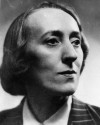 Greta Kuckhoff
(1902 - 1981) was a member of the Rote Kapelle [Red Orchestra]
group which engaged in resistance activities and espionage within Germany
during the Nazi era. She and her husband, Adam Kuckhoff, joined the
organization in 1933. On September 12, 1942 she (in Berlin) and her
husband (in Prague) were arrested.
Greta Kuckhoff
(1902 - 1981) was a member of the Rote Kapelle [Red Orchestra]
group which engaged in resistance activities and espionage within Germany
during the Nazi era. She and her husband, Adam Kuckhoff, joined the
organization in 1933. On September 12, 1942 she (in Berlin) and her
husband (in Prague) were arrested.
Effective October 2, 1936, the Nazi state had reactivated a special court, the Reichs Krieg Gericht (RKG) [Imperial War Court], to try certain high crimes. Among these were treason and military desertion.
Greta and her husband were tried in the RKG. The trial lasted from February 1 to 3, 1943. She was found guilty of "aiding and abetting an activity in preparation to commit high treason and for failing to report an intent to commit espionage." She and her husband were both sentenced to death. In a review of her sentence on May 4, 1943, the president of the RKG lifted the death sentence and ordered a retrial.
In her second trial she was found guilty of "aiding and abetting a high-treasonous undertaking and aiding the enemy." Her sentence was reduced to 10 years in prison and suspension of her rights as a citizen. Her husband was executed on August 5, 1943.
Greta Kuckhoff was freed from prison by the Red Army on May 8, 1945. She joined the KPD and later became the president of the State Bank of the GDR.
10. 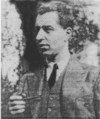 Jurgen Kuczynski
was a leading intellectual in the GDR. He was born in 1904 and died in
Berlin in 1997. His specialties were history and economics. He studied
philosophy, statistics, and political economy in Erlangen, Berlin, and
Heidelberg. He was a research student in the US from 1926 to 1929. He then
returned to Berlin and in 1930 he joined the KPD. Some time thereafter, he
was recruited to Soviet espionage. In 1936, he went into exile in England
where he was recruited to the OSS. He recruited the German physicist Klaus
Fuchs, who was then in exile in England, for Soviet espionage. Fuchs
became an especially valuable asset for the Soviets after he joined the
Manhattan Project in Los Alamos under Robert Oppenheimer. Kuczynski's
sister, Ruth Werner, who was an agent for the intelligence service of the
Red Army, was Fuchs' handler while he was in England. (Ruth Werner's
extremely interesting autobiography is available in English as Sonya's
Report.)
Jurgen Kuczynski
was a leading intellectual in the GDR. He was born in 1904 and died in
Berlin in 1997. His specialties were history and economics. He studied
philosophy, statistics, and political economy in Erlangen, Berlin, and
Heidelberg. He was a research student in the US from 1926 to 1929. He then
returned to Berlin and in 1930 he joined the KPD. Some time thereafter, he
was recruited to Soviet espionage. In 1936, he went into exile in England
where he was recruited to the OSS. He recruited the German physicist Klaus
Fuchs, who was then in exile in England, for Soviet espionage. Fuchs
became an especially valuable asset for the Soviets after he joined the
Manhattan Project in Los Alamos under Robert Oppenheimer. Kuczynski's
sister, Ruth Werner, who was an agent for the intelligence service of the
Red Army, was Fuchs' handler while he was in England. (Ruth Werner's
extremely interesting autobiography is available in English as Sonya's
Report.)
In the postwar era, Kuczynski served in various high level posts in the government and academia of the GDR. He was also a member of the Central Committee of the SED. He was an extremely prolific writer and the possessor of one of the largest and most valuable private libraries, containing about 70 thousand volumes. In 2003 his library became the property of the Central and State Library in Berlin.